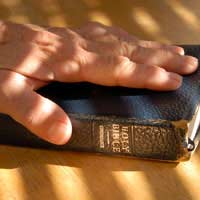Lectio Divina Meditation Explained

The Lectio Divina is a Christian form of meditation aimed at allowing the individual to experience the presence of the triune God – the God of the Christian trinity who is on being yet comprised of the Father, the Son (Jesus) and the Holy Spirit.
The practice of the Lectio Divina (meaning ‘Holy Reading’) was first documented in the early 3rd Century. Lectio Divina involves concentrated study of biblical scripture, and the subsequent meditation upon the facets of the particular area of scripture that you have focused upon.
Practising Holy Reading
Holy Reading is much like meditation and involves first clearing the mind in a quiet setting, preferably dedicated for the purpose of reading and contemplation.
Once you have calmed yourself and are ready to dedicate yourself to reading you may wish to pray first for guidance from God before proceeding.
Following this there are four stages to the Lectio Divina. Firstly, the ‘Lectio’ involves reading the passage diligently, slowly and several times over. Secondly, Meditation involves a considered and slow contemplation of the text, akin to meditation yet more, in which any area of the text that stands out, if only one word, is to be focused upon. The third stage, Oratio, involves intuitively opening your heart to God in order to feel the meaning of the text, and to invite a ‘dialogue with God’. The final stage, ‘Contemplatio’, involves listening to God. This stage involves completely clearing the mind and noting the impressions that arise, and is most akin to meditation in the sense that it is practiced in other spiritual disciplines, where the aim might be to listen to the essence of the Universe, or to attain a oneness with all things.
Although clear parallels can be seen between this form of contemplation and meditation, it must be noted that this form depends on a deep held belief in God and Christianity. However, the Lectio Divina does not entail entering literally into a discussion with God in which his voice is audible to us, and can rather be seen as a discussion with our own inner ‘calm’ in the form of an acknowledgment that it exists as more truthful than the complex lives we erect around us.
An exercise similar to the Lectio Divina, but requiring less time and quiet around us is ‘Stichomancy’. Stichomancy involves merely opening a random page of the Bible and reading one or two lines. From here you can let the lines sink in until you realise the relevance of these words to your life – this could take a few hours or a few days. In this case books apart from the Bible can be used.
Both the Lectio Divina and Stichomancy point, along with other practices, to the centrality of reading and contemplation to meditative exercise. Many people feel calm after reading a book at night, and for this reason there is no reason why any sort of careful and considered reading cannot form part of your relaxation regime. You could perhaps follow this with meditation, if you wish.
Business Energy With a Difference
If you are looking for business energy or need advanced solutions like remote energy monitoring, new supplies, downgrading or upgrading capacity, have a no obligation chat with Purely Energy.
To find our more get in touch here. or call 0161 521 3400.








